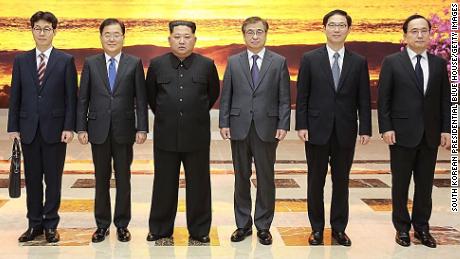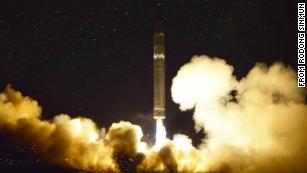North Korea's Kim Jong Un talks of rewriting history after dinner with South Koreans
Seoul, South Korea (CNN)North Korean leader Kim Jong Un told a high-ranking South Korean government delegation that he wants to "write a new history of national reunification," during an unprecedented meeting between the two sides in Pyongyang Monday.
North Korean state media released images and comments from Kim's dinner meeting with the South Korean officials, who included Seoul's national security chief Chung Eui-yong. South Korea confirmed the meeting, which it said lasted for four hours from 6 p.m. Monday local time and included Kim's wife Ri Sol Ju and sister Kim Yo Jong.
It's believed to be the first time Kim has spoken face-to-face with officials from the South since he took power in 2011. It was also the first time a South Korean delegation had ever set foot in the main building of Korean Workers' Party, according to South Korean officials.
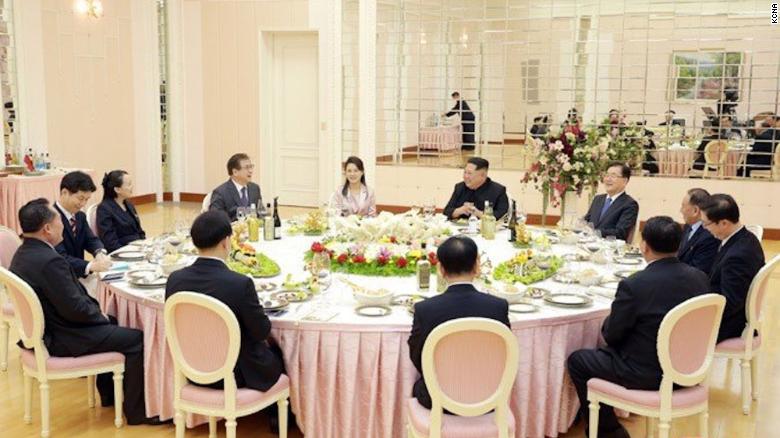
North Korean leader Kim Jong Un (center right) sits with a visiting South Korean delegation in Pyongyang and other high-level North Koreans.
North Korea's state-run Korean Central News Agency (KCNA) described the encounter as an "openhearted talk" over issues aimed at "improving the North-South relations and ensuring peace and stability on the Korean Peninsula."
The Seoul delegation also delivered a personal letter from South Korean President Moon Jae-in to Kim, according to KCNA.
The South Koreans' trip north marks the latest development in President Moon's efforts to broker a diplomatic agreement to the crisis brought about by North Korea's pursuit of nuclear weapons. The visit comes in the wake of the thaw brought about by North Korea's attendance at the PyeongChang Winter Olympics last month.
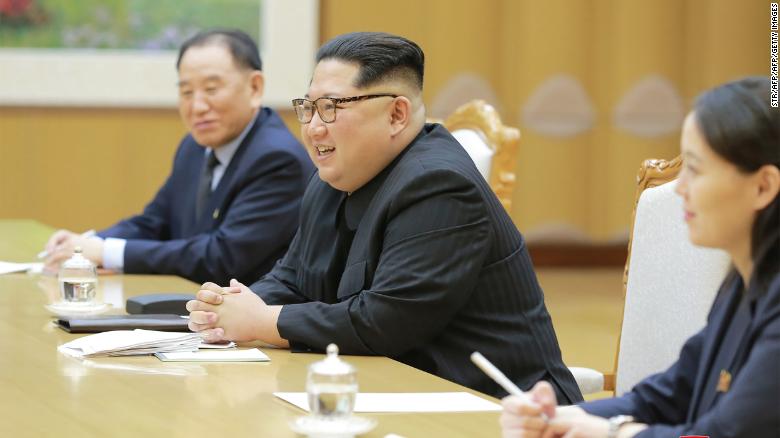
This picture released from North Korea's official Korean Central News Agency (KCNA) on Tuesday shows North Korean leader Kim Jong Un (center) meeting with the South Korean delegation. To Kim's right is his sister and confidante, Kim Yo Jong.
The meeting marks a dramatic departure from 2017, when a string of North Korean weapons tests and hostile rhetoric from US President Donald Trump and Kim heightened tensions on the Korean Peninsula.
"Kim Jong Un as a leader has kept himself highly circumscribed. This is not someone who has met with many non-North Koreans in almost six years," said John Delury, a professor at Yonsei University's Graduate School of International Relations in Seoul.
"It's a major signal of his personal commitment to this process and it gives the South Koreans, for the first time, someone can get a read on Kim Jong Un himself."
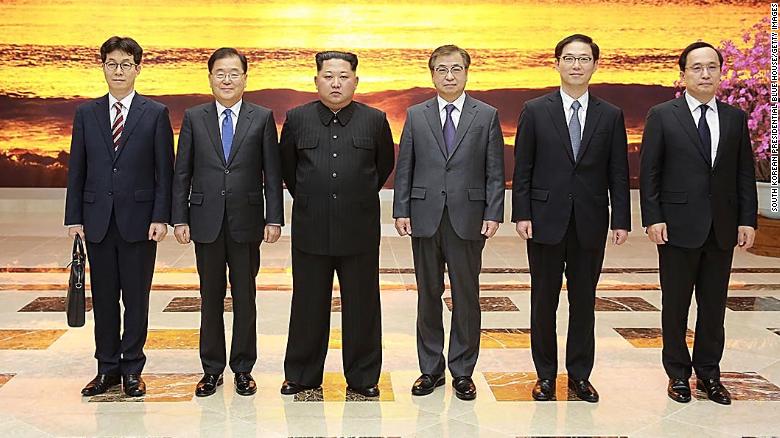
Chung Eui-yong (second left), head of the presidential National Security Office pose with North Korean leader Kim Jong Un on Monday in Pyongyang, North Korea.
To date, Kim has met few foreigners since taking control of the hermit state. He's hosted former basketball star Dennis Rodman on multiple occasions and was photographed clasping hands with Liu Yunshan, a former top leader of China's Communist Party, at a military parade in 2015.
Kim did not appear to meet with a senior Chinese envoy who was sent to North Korea for rare talks in November 2017, nor did he meet with former US Director of National Intelligence James Clapper, who traveled to Pyongyang for a rare visit nearly four years ago.
US official says North Korea is making progress on missile guidance
The United States has said it would be willing to meet with North Korea, but has always insisted that Pyongyang eventually abandon its nuclear weapons program as part of any talks, a stance Trump reiterated Saturday night.
North Korea's Foreign Ministry, for its part, accused the US of refusing to recognize realities on the ground and putting forward unrealistic roadblocks to dialogue.
Momentum
The Olympic detente has been an opportunity for the Moon administration to try to prevent an escalation of last year's tensions.
"There's a clear determination on Moon's part not to lose momentum after the Olympics," said Euan Graham, the director of the international security program at the Lowy Institute, an Australian think tank.
To that end, the South Korean delegation in Pyongyang will "have an in-depth discussion on measures to continue various talks between North Korea and the international community, including the United States," according to Chung.
"Above all, I will communicate clearly the will and intention of the president, who wants the de-nuclearization of the Korean Peninsula, and create a lasting peace by utilizing the flow of the inter-Korean dialogue," Chung said.
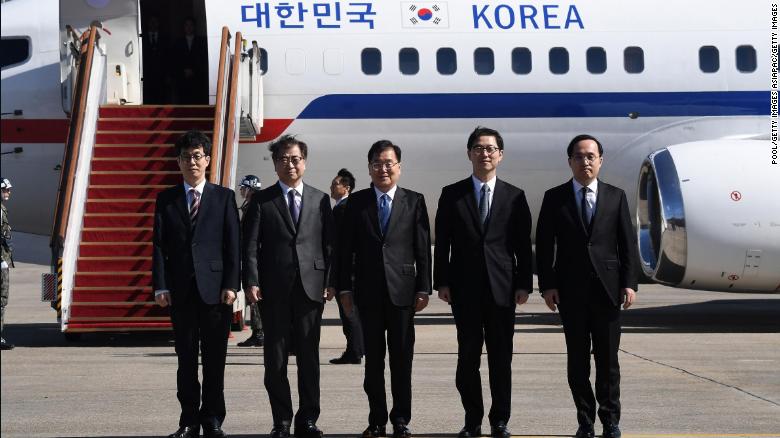
Chung Eui-yong (center), head of the presidential National Security Office, Suh Hoon (second left), the chief of the South's National Intelligence Service, and others pose before boarding an aircraft as they leave for Pyongyang at a military airport on Monday.
Moon, who was elected last year after his conservative predecessor was ousted in a corruption scandal, has been proponent of dialogue and engagement with North Korea since his days as a presidential aide in the 2000s.
Now he has the difficult job of playing interlocutor between a North Korean regime steadfastly clinging to its nuclear weapons program -- which it sees as the only way to ensure the survival of its regime -- and an administration in Washington that believes Pyongyang's development of a long-range ballistic missile potentially capable of hitting the US homeland with a nuclear warhead constitutes an unacceptable risk.
"What Moon is trying to do is interpose himself between North Korea and the United States so that there is a kind of defusing role that the South Koreans play, naively or not, in trying to at least sort of forestall any ramping up of tensions," Graham said.
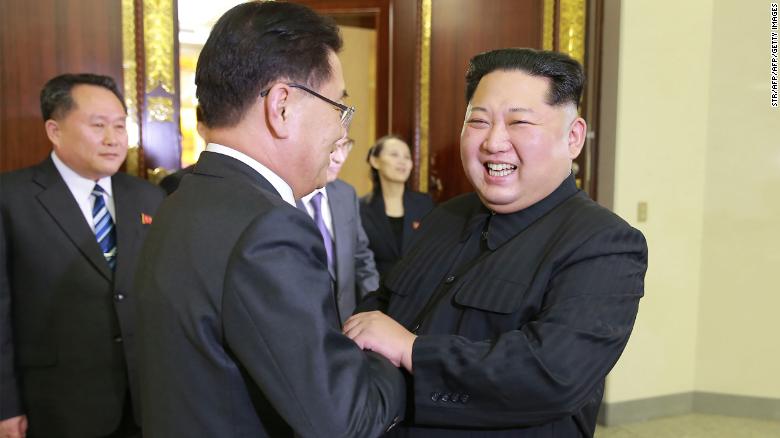
Kim Jong Un is seen shaking hands with South Korean chief delegator Chung eui-yong.
Another trip north?
Though Chung is officially leading the delegation, the attendance of South Korea's spy chief, Suh Hoon, could signal that the two sides are laying the groundwork for Moon to eventually meet with Kim in person.
Moon was invited north last month by Kim's sister, Kim Yo Jong, who also serves as the head of the country's propaganda department. She was in South Korea last month to attend the Winter Games opening ceremony.
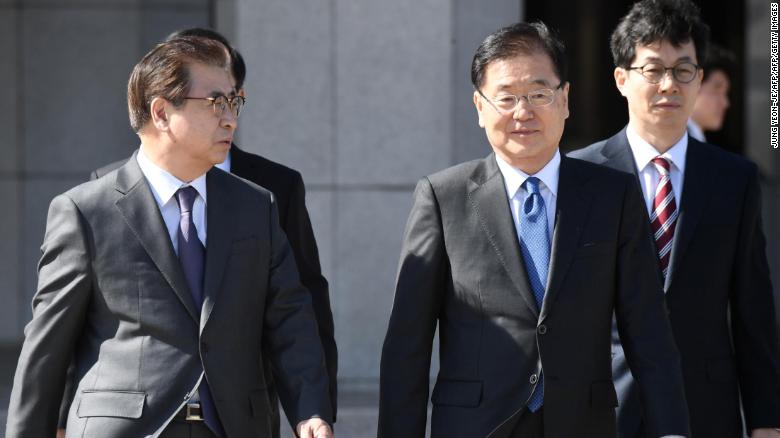
Chung Eui-yong (second from the right), head of the presidential National Security Office, and Suh Hoon (left), the chief of the South's National Intelligence Service, talk before leaving for Pyongyang Monday.
Suh was tapped by Moon to serve as the director of South Korea's National Intelligence Service. His appointment fueled speculation about a new inter-Korean summit, as Suh helped organize the two inter-Korean summits in the 2000s that saw two consecutive South Korean presidents travel north to meet with Kim Jong Il.
Sending Suh to Pyongyang "suggests they're already taking about summit preparations," said Graham.
The delegation is expected to return to Seoul Tuesday and then travel to the United States to brief American officials.
Joshua Berlinger reported and wrote from Hong Kong and Sophie Jeong reported from Seoul. CNN's Sol Han and Jungeun Kim contributed to this report
News Courtesy: www.cnn.com

